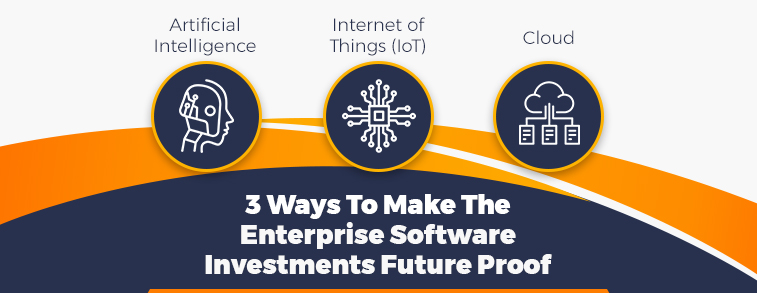3 Ways To Make The Enterprise Software Investments Future Proof


3 Ways To Make The Enterprise Software Investments Future Proof
Enterprise Software systems are specifically developed to meet the growing needs of an organization. These are tailor-made solutions carefully designed to meet specific business objectives, automate several business processes, and serve as a robust and scalable system. Businesses across healthcare, BFSI, manufacturing, IT and retail industries are heavily investing in such systems which has resulted in an increasing demand to not just meet but exceed their expectations.
“According to a recent report published by Market Research Future, the Global Enterprise Software market is growing at a CAGR of 8% since 2016 and is expected to reach USD 634 Billion by 2023.”
However, the adoption and efficiency of an Enterprise software system greatly depends on the underlying technologies it leverages. With the advent of newer technologies, a lot of emphasis is being put to make Enterprise software systems smarter, feature-rich, and efficient.
Let’s look at 3 such technologies that have revamped the way Enterprise software systems function –
- Artificial Intelligence
The most common application of Artificial Intelligence is on CRM and ERP systems. AI enables CRM and ERP development companies to enhance these systems using Machine Learning and Natural Language Processing. An AI-enabled CRM or ERP software can perform predictive analysis on huge chunks of data, provide insights on key data, further enriching the overall operational efficiency.
Imagine an AI-powered Bot developed within an ERP system for a manufacturing company. The Bot can provide insights on high-performing products, warehouse management, and forecasting. - Internet of Things (IoT)
IoT enables real-time data push and pull from all kinds of external devices & systems into the CRM and ERP systems. Such modern software systems provide benefits such as enhanced data quality, improved business intelligence, and smarter business processes.
Considering the same example as that of a manufacturing company, an IoT enabled ERP system seamlessly collects, analyses, and produces refined data to manage the entire product life cycle. Such an ERP can provide insights on re-orders, out-of-stock products, and performance evaluation of a product.
- Cloud
Cloud-based CRM and SaaS solutions have been experiencing an upsurge in traction since 2019. The demand for such cloud-connected systems is owing to the operational and cost benefits they bring in.
SaaS applications are highly scalable which allows enterprises to select which model suits their business needs most efficiently.
Reduced costs is another aspect as Cloud-based CRM’s are comparatively easier to manage as opposed to an on-premise system. SaaS-based applications normally work on a subscription-based model, allowing enterprises to “Pay as they use”.
At Aress, we are constantly looking for ways to fine-tune our skillsets & expertise and keep pace with newer technologies. With the help of our CoE and team of Subject Matter experts, we were able to build and deliver several complex enterprise software systems for our customers. With a rich experience of 20 years, we have closely worked with several enterprises in terms of defining their software development needs and delivering the “right-fit” solution for them. Visit us at https://www.aress.com/ to know more.
Category: GenAI & Data Engineering
Recent Posts
-
GenAI & Data Engineering
From ‘Back-Office’ to ‘The Heart of the Business’
-
GenAI & Data Engineering
Aress OrderIt: Building an Intelligent Quick Commerce Delivery Platform with AI-Powered Optimization
-
24x7 Technical Support
Top 10 MSP Trends Driving Scale, Security, and Profitability in 2026
-
GenAI & Data Engineering
The 2026 Blueprint: 4 Pillars of Effective Cloud Data Management
-
Digital
Why Traditional QA Audits Fail at Scale in Contact Centers
 +91 253 6630710
+91 253 6630710 781.258.1274
781.258.1274 +44 (0) 7446 87 37 97
+44 (0) 7446 87 37 97